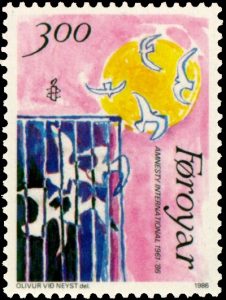Senthorun Raj discusses how pop culture stereotypes about homosexuality enable bureaucratic violence towards refugees for the 16 Days of Activism Against Gender Violence.

What do Madonna, Oscar Wilde, Greco-Roman wrestling, clubbing at Stonewall, and having a lot of sex have in common? Not much really, other than the fact that Australian refugee decisions are saturated with these stereotypes – stereotypes that have been used to determine whether a person is “genuinely” gay and subject to a “well-founded fear of persecution.” As a gay man who some politicians would class as “elite” because I live in the inner city suburb of Sydney and prefer investing in books than mortgages, I could tell you very little about Oscar Wilde’s literary contributions. Yet, for same-sex attracted refugees, the demand to prove “gay identity” is no joke. The bureaucratic violence perpetrated against queers who seek refuge leaves more to be desired.
Since 1992, Australia has recognised that sexual minorities (or, more specifically “homosexuals” of a particular country) can be recognised as a “particular social group” for the purposes of seeking asylum under the Convention Relating to the Status of Refugees 1951 and the associated 1967 Protocol. Australia was ahead of the international curve when it came to offering protection to sexual minority refugees, but many of the decisions made during the first decade of recognition concentrated on the idea of “discretion.” Specifically, if a gay or lesbian refugee had the audacity to kiss or hold hands in public, the persecution they faced was a consequence of their visibility (or lack of discretion). Many decision-makers dismissed these claims, suggesting that persecution could be avoided if such refugees were “discreet” about their sexuality. In 2003, the High Court of Australia ruled that such an expectation was unlawful and breached a core principle of the Refugee Convention: refugees should not be required to hide the very characteristic that forms the basis of their protection claim.
As Jenni Millbank notes, given that discretion could no longer be used to deny sexual minority refugees protection, decision-makers shifted their attention to interrogating the credibility of a person’s avowed sexual orientation. While most of us would find it difficult to answer intrusive questions about our sexual activity, in refugee cases, the demand to map a comprehensive sexual history can be rather absurd. In one case from 2010, a gay asylum seeker from Lebanon lamented:
Although I was happy to finally be in a country where I could be open about my homosexuality, it does not mean that overnight I would turn into a promiscuous person willing to engage in homosexual activities with any man that I met.
Apparently, being gay is necessarily synonymous with wanting to be sexually active. That also translates into proving that you like frequenting venues on Oxford Street or maybe even reading some Oscar Wilde before bed.
Lesbian or bisexual refugees often face a different challenge: they are denied credibility because they do not conform to norms of public promiscuity and group association. In a 2008 case, a female asylum seeker from Mongolia was disbelieved because her experiences of intimacy were not seen as conducive to that of a “real” relationship. The Refugee Review Tribunal (RRT) said:
I accept that the applicant has a girlfriend and that she has had a close relationship with this friend since [year] I have doubts as to whether their relationship is a lesbian relationship as the evidence as to how they first met and their lack of involvement in the lesbian community is of concern. Further the applicant gave little details of the nature of the relationship and I felt she was being evasive as to the real basis of their friendship.

While the applicant in this case was found to be a refugee, the association between her claim to a lesbian identity and the lack of involvement in the public “lesbian community” in her country of origin limited her credibility. As the applicant did not travel with her partner and chose not to come out publicly, the RRT characterised such intimacy as platonic rather than sexual or romantic.
However, if you are a refugee with answers that seem scripted, then decision-makers may deem you suspicious. In fact, s5J(6) of our Migration Act 1958 enables decision-makers to discount any activity undertaken in Australia that is deemed to be self-serving for an asylum claim. Recent changes to our migration laws have also cast doubt on what expressions of a person’s sexual orientation will generate protection obligations.
In 2011, a lesbian asylum seeker from Uganda had her claim rejected, because her relationship with another woman was considered suspect. According to the Department of Immigration and Citizenship delegate, she “had merely adopted the persona of a homosexual” for a protection visa. The applicant, however, responded:
I have kept my homosexuality private in Uganda because I fear for my life. It is for this reason that I did not directly associate with or join lesbian groups.
Is it that hard to believe that in a country attempting to further criminalise homosexuality and where support groups for sexual minorities are consistently raided, that someone would be silent about not being heterosexual?
What a catch-22: either you are too gay, or you are not gay enough.
So how do we approach casework and decision-making in a way that does justice to the voices of refugees, rather than seeking to appropriate their experiences to fit within our “neat” stereotypes?

Most of us would laugh at the ongoing use of stereotypes. Yet, for refugees who are persecuted for their sexual orientation or gender identity, this cannot be a matter for our entertainment.
Sexuality is not reducible to the pop culture we consume or the community groups we attend. Our experiences of being lesbian, gay, bisexual, queer, or however else you identify is specific to our cultural and geographical context, and that means it is not always contingent on a shared love of Kylie Minogue or Beyoncé.
Incorrect status determinations are dangerous because they can facilitate the return of refugees to places where their life or liberty is threatened.
This is even more worrying because Australia’s offshore detention, processing, and (temporary) resettlement of refugees for the past three years has been done in countries that criminalise homosexuality (Nauru only decriminalised homosexuality in 2016). Numerous reports by Amnesty International, the United Nations, and Human Rights Watch have highlighted the violence, self-harm, and illness that characterise indefinite detention.
With a significant number of asylum claims based on sexual orientation (and gender identity and intersex status separately) being processed, we have an ethical obligation to end the humiliation and abuse that shapes the refugee processing system and ensure that queer claims – indeed all claims – are treated with basic decency and respect.
~
RISE: Refugees, Survivors and Ex-Detainees is an organisation which provides welfare and advocacy for refugee and asylum seekers in Australia. It is governed by refugees, asylum seekers and ex-detainees. To donate, click here.
 Senthorun Raj recently submitted his Ph.D. at Sydney Law School at The University of Sydney and has been appointed as a Lecturer in Law at Keele University.
Senthorun Raj recently submitted his Ph.D. at Sydney Law School at The University of Sydney and has been appointed as a Lecturer in Law at Keele University.
Follow Senthorun on Twitter @senthorun.
Copyright remains with individual authors who grant VIDA holding a perpetual, world-wide, royalty free and non-exclusive license to use, distribute, reproduce and promote content. For permission to re-publish any VIDA blog post, in whole or in part, please contact the managing editors at auswhn@gmail.com.au
